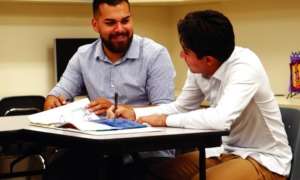President Bush is right to make after-school programming for American teens a high priority in these early days of his administration. It is a safe, feel-good issue. With most crime and teen sex occurring between 2 p.m. and 8 p.m., who would dispute the need for safe havens and learning opportunities in the non-school hours?
Regardless of what you think of America’s Promise, Colin Powell’s efforts to highlight the vital role of volunteer mentors and coaches helped Americans see the connection between well-run youth initiatives and healthy development. The vast majority of Americans – working long hours and fearing what adults have always feared when their kids spend too much time unsupervised – indicate in polls that they support public spending for youth development.
Given this consensus, what could get messed up?
A lot.
Buried within the Elementary and Secondary Education Act is funding for a popular initiative that provides less than 10 percent of American school districts with opportunities to develop after-school programs. When Congress debates the reauthorization of the 21st Century Community Learning Centers (this year’s spending is $846 million, of which $205 million will be for 400 new grants), the first question will be: Who should get the dollars?
Republicans think some should go to community and faith-based programs, believing that this is where the energy and creativity of empowered citizens can play out without government interference. Yet right now only school districts, not community groups, get the dollars through a national competitive grants program. One issue is whether to change the rules, as suggested by the White House, to allow direct funding of community and faith-based groups.
Then there is the issue of which kind of community groups, and here it gets interesting. There is a choice between the large downtown youth-serving agencies – Goliaths with pools and high level citizen boards – and the little storefront organizations, which often have the deepest ties to youth at greatest risk. The big groups can meet procurement standards. The little ones have a hard time with health and safety standards, keeping solid fiscal controls, and collecting information on what the programs actually do and accomplish.
As for the faith groups, let them compete. They often work with young people with the most barriers to self-sufficiency. The secularists should fear not, because the weakest of the faith groups will have an especially hard time meeting even minimal government standards. Thank the Lord. Even youth programs with Biblical names and inspirational choirs can design crummy programs, or worse, misuse funds.
Another policy dilemma is whether school districts with teens most in need should receive the funds, or whether the grants competition should switch to a formula-funded initiative in which every school district in the nation gets something – however puny.
Even the focus of the leaning centers is up for grabs. Should it be based, as it is now, on a generous menu of activities? Should the focus be tied more directly to anti-crime and anti-drug abuse practices, as proposed by the Bush administration? Or should the 21st Century Learning Centers put the emphasis on homework and learning, as American teachers have urged?
We have to get it right. The population of 10-to-19-year-olds in the United States is predicted to jump to 44 million in two decades, the highest level in our history. That’s a stunning about-face after a 25-year decline.
We need a smarter and more targeted approach. We can’t yield to the temptation to spread limited resources everywhere. Community and faith-based groups should be allowed to compete for federal funds, but the winners must be strong enough to accomplish something of value for youth, along with meeting accountability standards.
This will mean working with highly experienced youth work leaders from either secular or faith-based networks. The tiny solo program – David with untested results – may inspire, but faith alone does not make a good youth program.
Andrew Hahn is professor and director of the Heller School’s master’s degree programs in children, youth and family studies, Brandeis University, Waltham, Mass. Contact: ahahn@brandeis.edu.






























